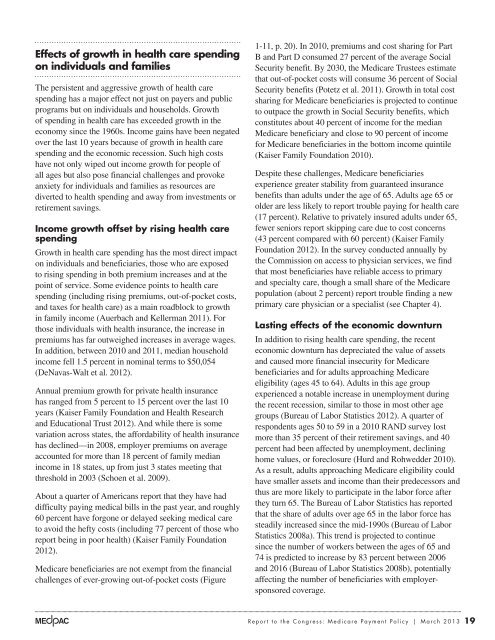Medicare Payment Policy
Medicare Payment Policy
Medicare Payment Policy
Create successful ePaper yourself
Turn your PDF publications into a flip-book with our unique Google optimized e-Paper software.
effects of growth in health care spending<br />
on individuals and families<br />
The persistent and aggressive growth of health care<br />
spending has a major effect not just on payers and public<br />
programs but on individuals and households. Growth<br />
of spending in health care has exceeded growth in the<br />
economy since the 1960s. Income gains have been negated<br />
over the last 10 years because of growth in health care<br />
spending and the economic recession. Such high costs<br />
have not only wiped out income growth for people of<br />
all ages but also pose financial challenges and provoke<br />
anxiety for individuals and families as resources are<br />
diverted to health spending and away from investments or<br />
retirement savings.<br />
Income growth offset by rising health care<br />
spending<br />
Growth in health care spending has the most direct impact<br />
on individuals and beneficiaries, those who are exposed<br />
to rising spending in both premium increases and at the<br />
point of service. Some evidence points to health care<br />
spending (including rising premiums, out-of-pocket costs,<br />
and taxes for health care) as a main roadblock to growth<br />
in family income (Auerbach and Kellerman 2011). For<br />
those individuals with health insurance, the increase in<br />
premiums has far outweighed increases in average wages.<br />
In addition, between 2010 and 2011, median household<br />
income fell 1.5 percent in nominal terms to $50,054<br />
(DeNavas-Walt et al. 2012).<br />
Annual premium growth for private health insurance<br />
has ranged from 5 percent to 15 percent over the last 10<br />
years (Kaiser Family Foundation and Health Research<br />
and Educational Trust 2012). And while there is some<br />
variation across states, the affordability of health insurance<br />
has declined—in 2008, employer premiums on average<br />
accounted for more than 18 percent of family median<br />
income in 18 states, up from just 3 states meeting that<br />
threshold in 2003 (Schoen et al. 2009).<br />
About a quarter of Americans report that they have had<br />
difficulty paying medical bills in the past year, and roughly<br />
60 percent have forgone or delayed seeking medical care<br />
to avoid the hefty costs (including 77 percent of those who<br />
report being in poor health) (Kaiser Family Foundation<br />
2012).<br />
<strong>Medicare</strong> beneficiaries are not exempt from the financial<br />
challenges of ever-growing out-of-pocket costs (Figure<br />
1-11, p. 20). In 2010, premiums and cost sharing for Part<br />
B and Part D consumed 27 percent of the average Social<br />
Security benefit. By 2030, the <strong>Medicare</strong> Trustees estimate<br />
that out-of-pocket costs will consume 36 percent of Social<br />
Security benefits (Potetz et al. 2011). Growth in total cost<br />
sharing for <strong>Medicare</strong> beneficiaries is projected to continue<br />
to outpace the growth in Social Security benefits, which<br />
constitutes about 40 percent of income for the median<br />
<strong>Medicare</strong> beneficiary and close to 90 percent of income<br />
for <strong>Medicare</strong> beneficiaries in the bottom income quintile<br />
(Kaiser Family Foundation 2010).<br />
Despite these challenges, <strong>Medicare</strong> beneficiaries<br />
experience greater stability from guaranteed insurance<br />
benefits than adults under the age of 65. Adults age 65 or<br />
older are less likely to report trouble paying for health care<br />
(17 percent). Relative to privately insured adults under 65,<br />
fewer seniors report skipping care due to cost concerns<br />
(43 percent compared with 60 percent) (Kaiser Family<br />
Foundation 2012). In the survey conducted annually by<br />
the Commission on access to physician services, we find<br />
that most beneficiaries have reliable access to primary<br />
and specialty care, though a small share of the <strong>Medicare</strong><br />
population (about 2 percent) report trouble finding a new<br />
primary care physician or a specialist (see Chapter 4).<br />
Lasting effects of the economic downturn<br />
In addition to rising health care spending, the recent<br />
economic downturn has depreciated the value of assets<br />
and caused more financial insecurity for <strong>Medicare</strong><br />
beneficiaries and for adults approaching <strong>Medicare</strong><br />
eligibility (ages 45 to 64). Adults in this age group<br />
experienced a notable increase in unemployment during<br />
the recent recession, similar to those in most other age<br />
groups (Bureau of Labor Statistics 2012). A quarter of<br />
respondents ages 50 to 59 in a 2010 RAND survey lost<br />
more than 35 percent of their retirement savings, and 40<br />
percent had been affected by unemployment, declining<br />
home values, or foreclosure (Hurd and Rohwedder 2010).<br />
As a result, adults approaching <strong>Medicare</strong> eligibility could<br />
have smaller assets and income than their predecessors and<br />
thus are more likely to participate in the labor force after<br />
they turn 65. The Bureau of Labor Statistics has reported<br />
that the share of adults over age 65 in the labor force has<br />
steadily increased since the mid-1990s (Bureau of Labor<br />
Statistics 2008a). This trend is projected to continue<br />
since the number of workers between the ages of 65 and<br />
74 is predicted to increase by 83 percent between 2006<br />
and 2016 (Bureau of Labor Statistics 2008b), potentially<br />
affecting the number of beneficiaries with employersponsored<br />
coverage.<br />
Report to the Congress: <strong>Medicare</strong> <strong>Payment</strong> <strong>Policy</strong> | March 2013<br />
19


